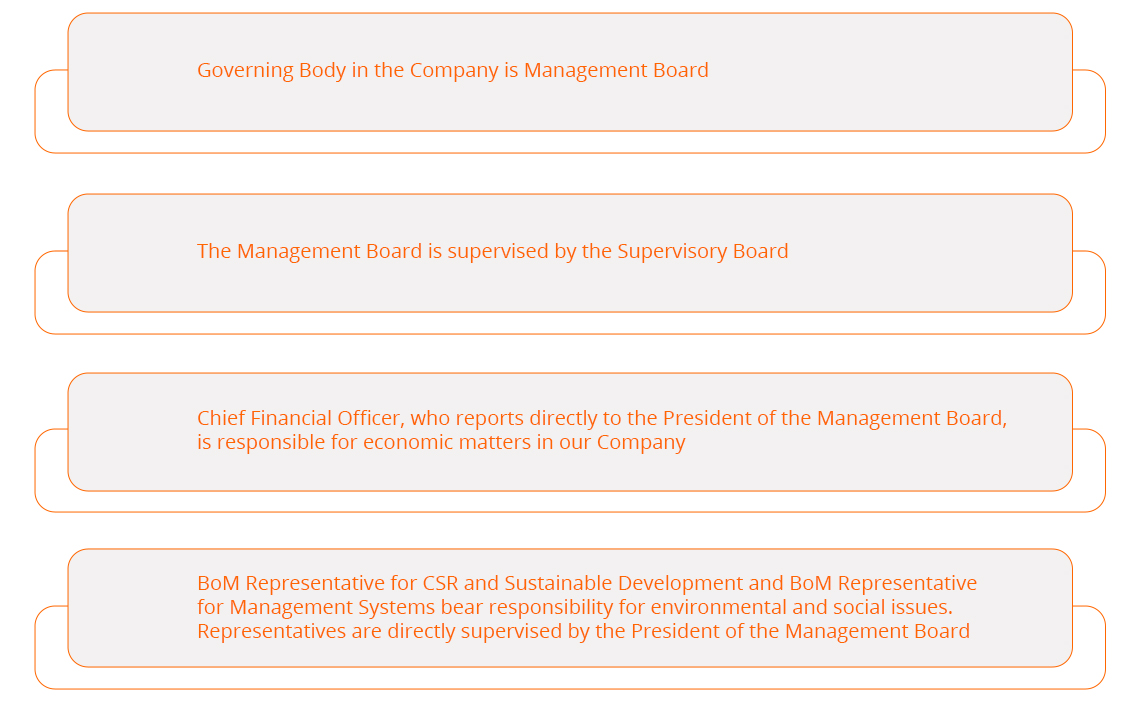By attaining new markets and unlocking hitherto unknown business areas, we promote sustainable chemistry, geared towards rational use of resources and safeguarding the natural environment.
Our Business
We continually strive to increase the value of our company, effectively using our potential, innovation and resources. We maintain a strong position as a leading surfactant manufacturer in Poland and Central and Eastern Europe. We acquire new markets and discover unknown areas of business. We promote sustainable chemistry that is geared towards rational use of resources and care for the natural environment.
Management in the Company
Our business relationships are based on a mutual understanding and joint action with respect for ethics and environmental protection.
unfold a statementcollapse the statement
Being a company with a global reach, cooperating with many international corporations, we insist that stakeholders adopt the principles of Sustainable Development and Corporate Social Responsibility. Our relationships are based on a mutual understanding and business ethics, with respect for environmental protection and responsibility for the communities in which we operate.
Tugba Özcelik
Sales Specialist
As a joint stock company, we are obliged to apply the principles set out in the “Best Practices of WSE Listed Companies” (the Stock Exchange). The purpose of these practices is to strengthen the transparency of listed companies, to improve the quality of communication with investors, to strengthen the legal protection of shareholders’ rights also in matters not regulated by law, and not to create burdens for listed companies that are not counterbalanced by market demands. Therefore, Good Practices concern only areas in which their use can have a positive impact on the market valuation of businesses and thus reduce the cost of raising capital.
Detailed information on corporate governance is available on PCC EXOL’s website.
MANAGEMENT SUPPORT IN THE COMPANY
Support in management processes in PCC EXOL SA includes systems which are based on the way they work and allow for the optimising of processes in specific areas of the company’s operations such as production, sales, planning, logistics, purchasing of raw materials, and quality assurance.
The most important management systems implemented at PCC EXOL SA:
- Quality Management System according to ISO 9001: 2008
- Environmental Management System according to ISO 14001: 2004
- Occupational Health and Safety Management System according to OHSAS 18001
- GMP Good Manufacturing Practices (GMP) guidelines according to GMP EFfCI
- RSPO (Roundtable on Sustainable Palm Oil)
- Responsible Care Management System
INTERNAL AUDITS
Within the implemented management systems, a team of Internal Auditors was set up. It is responsible for conducting audits determining the extent to which the guidelines contained in manuals, procedures, and other documents conform to the standards of various management systems.
Audits occur at regular intervals according to an approved annual schedule. As a result of the audits, reports are prepared that provide the basis for corrective and improvement actions in the areas that have been examined. (in the graph below should be translated ‘number of internal audits conducted.
We are gradually increasing the number of audits in each of our company’s organisational units.
The increased number of internal audits in 2016 resulted from the company’s preparation for OHSAS 18001 certification. This enabled us to identify areas that are essential to the improvement process and to implement an action plan in this area.
EXTERNAL AUDITS
Maintaining certified management systems obliges our company to carry out third-party audits annually. These are the most commonly certification audits conducted by independent external organisations. They confirm the implementation and application of international guidelines and national standards adopted in the company.
PCC EXOL SA also conducts audits of the other party conducted by parties interested in the functioning of our company, in which we show an open attitude towards our stakeholders. The purpose of these audits is often to qualify our company as a reliable supplier of chemical products.
STATE INSTITUTIONS AND CONTROL UNITS
The specificity of the chemical industry in which PCC EXOL SA operates determines the conduct of a reliable and transparent dialogue with the state administration. Reporting, inspections and inspections support measures concerning the monitoring of the quality of the provided services, the level of security and the impact on the environment. Most of the issues formulated in the course of control activities concern employee safety and health, quality assurance, product safety, environmental protection, employee rights and procedural safety. Explanations are made both verbally during a direct visit of control units as well as in writing, in response to the company’s external communications.
In 2016 8 inspections were carried out in the company, the results of which showed no discrepancies and reservations.
RISK MANAGEMENT
The business we involve ourselves in, carries a number of risks, among which we have identified as operational, financial, business, macro-economic, political, legal, environmental, and reputational risk. We monitor risks and their analysis is closely linked to the internal control system. A comprehensive approach to risk analysis allows us to take steps to minimise the occurrence of unexpected events.
The most important risks associated with our business are described in the Company Value Chain.
RESPONSIBILITY

Delegation of responsibility in the economic, environmental and social fields takes place through:
- Management Board delegates the power of attorney to represent the company in particular issues on the basis of the adopted resolution
- Extension of the duties, listed in the Workplace Charters
PRECAUTIONARY PRINCIPLE
Applying precautionary principles in our operations enables us to respond quickly to possible threats to human health and the environment. In every case where a full threat assessment can not be made, the use of this policy allows the implementation of measures to minimise the effects of existing threats.
 Management in the Company
Management in the Company Value Chain
Value Chain Our Products
Our Products Transport
Transport Our Investments
Our Investments